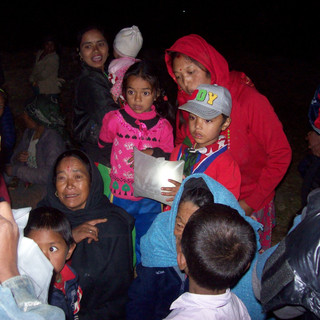BVF Fall 2017 Trip Report: Activities and Priorities
- Joel Meyers
- Feb 4, 2018
- 6 min read
In November of this year we had a great visit to Basa. So much happened I could write a book, so I will keep this to the point of a BVF USA trip report, highlighting what will be important to know as we plan 2018 activities and fundraising priorities.

I met Basa Foundation Nepal, Niru Rai, Manbir Rai, Buddiraj Rai, and Ganesh Rai, pictured above, before the rest of the trekking group arrived to gain insights and better focus my activities in Basa and Kathmandu. We had a great meeting and talked about priorities - mainly education.
Once the rest of the US-based trekkers arrived, including several Board members – Jeff Rasley, Mike Miller, Melissa Hudson and me – we toured around KTM for a couple days then all set off to go to Basa. In Basa we had an incredible “program” of awards, dance and happy frivolity. We gave shoes, LuminAID lights and speeches; Jeff announced this was his last trip to Basa, which was a momentous and sad thing to hear for Basa as he has been the “Godfather” of Basa for so long; the mantle was then formally handed off to me and I gave a short speech as well. After Basa, we split into three different treks then reconvened in KTM for a big dinner at Niru’s house.

Sanga Rai talking about, and handing out, LuminAID lights.
General Observations
The villagers seemed to be more relaxed and welcoming/accepting of our presence. I talked this over with Niru, et al, after the trek, and they confirmed the villagers had been, in the past, wary and suspicious of our activities and the influx of dollars to Basa Foundation Nepal, mainly born from their general mistrust of the Nepal government and their empty promises and misuse of funds. Over the last decade they have witnessed first-hand all the great work Niru and his team have produced from their efforts including what our donation dollars have funded.
Basa seems to be thriving, not just surviving. This was apparent in the general happiness and well-being and affluence they are enjoying due to their general needs being met more and more relative to the school, water, sanitation, electricity and repaired buildings. Each home has a water spigot which they use nearly constantly for washing dishes, hygiene and piping water to their new charpies (latrines). Each home ahs a smokeless stove which they also use nearly constantly for cooking.
They can now do better future planning. All the above has provided them with the basic necessities (and more) which has created a much better lifestyle where they have been able to relax and look more into the future of what they want and need (more on that below); including a next step for Basa Foundation: how they can help neighboring communities (this is very exciting).
The geography of Basa seemed to be lusher than ever. It may just have been me, but soon as I arrived in Basa there appeared to be more healthy and thriving plants, more livestock, more undergrowth and, well the landscape appeared to be healthier than neighboring villages and what I remember in the past.
The road to Basa is complete. There now exists jeep access to Basa, in fact a whole troop of trekkers were transported to Basa and the only “trekking” needed to get to the school was a hike down the hill (Melissa was carried on the back of a porter from the jeep to the school upon arrival – a 16 year old named Bijay). As you can imagine this opens up a tremendous opportunity for them to get supplies and to receive people who want to visit but don’t want to trek.
Smartphones everywhere: I witnessed Bijay (he was my porter when I initially trekked to Basa) working on his English using a smartphone app, it was a hangman type game that was helping him understand the written language. Every location we went to, event the remote stops, people had smartphones and like most people, they were regularly glued to them, from the youngest of toddlers, to the older lodge owners. With improved telecom networks people have access to apps and the internet. A huge shift from what I witnessed in 2009 and 2011. One can only imagine how this will change, and is changing, their access to information.
Priorities and Planning I had a “pre-planning” meeting with Niru, Buddhi, Manbir and Ganess before the treks and one after, on Nov. 24th. Our first meeting was fairly general yet the highlight was from Buddhi, who humbly and clearly stated that education is the foundation of how they can continue to expand opportunities for Basa. The meeting after the trek was key in understanding what their needs were and priorities. The more I talked with them, the more it was clear they had (have) been doing a lot of planning and laying the groundwork. They make it easy! The structure Jeff set up with them of presenting plans and budgets (and justifications) and a cost analysis for projects will be followed for 2018.
Here is what we discussed, in order of priority:
Teacher Salaries ongoing: Salaries for good teachers for the long run is their main priority. Education, as mentioned above, will be the foundation for how they will grow, evolve and thrive. They are hoping we can help them secure yearly funding for teachers. We already have helped them in 2017, if you recall, and would like to have that help again in 2018 and beyond. Costs, quality and number of teachers will need to be re-evaluated yearly.
Adding school programs and projects: Now that they are getting more of the education basics covered they are interested in expanding the education into the humanities, primarily music and the arts. I think this is great. They will need arts/music teacher(s) and materials, costs and itemized lists will be provided. And this is something we can certainly lend a hand in when we visit, bringing materials over in our bags. NOTE: Shipping to Nepal is expensive, so as a general rule they will purchase items there and we bring what we can when we visit. They have to pay tax on the items upon arrival.


Creation of the Health Clinic: Above are two photos of the existing Community House that needs repairs. The house is two stories, one story will be for the Health Clinic. They have identified several individuals who will “man” the Clinic, they are not doctors, per se, but can handle emergencies and triage. The concept of training nurses is still under debate – now that they have a road, they can transport patients to a larger, more established Health Clinic in a neighboring village within an hour or less (if they have a vehicle). We are also still discussing what medical supplies would be needed and costs.
Adding a “Special” English teacher: Learning English is a high priority for them. When I was there, alone before the rest of the trekking group arrived, I witnessed a school day. In the morning the children assembled (85 students) and they did role call, then guided calisthenics all in English…it was pretty impressive and fun to watch. As they strive to open up opportunities for the new generations, they want English to be a foundation as tourism is such an important aspect of the economic mainstay of Nepal and they want to support this. English and German seem to be the most important languages for porters to learn; English first. This will require better English teachers than who they have now. Budget and long term plan is forthcoming.

Adding school furniture: The school rooms have benches and tables yet they want to improve what is there now with the purchase of chairs, whiteboards, etc. They will provide a list with costs.
Acquiring computers and printers: The computers we provided in 2011 continue to die mainly because of general failures due to the climate and because they cannot get updates and fixes because of the lack of internet. They have a printer yet it is not working. We had delivered one additional laptop while we were there, thanks to Sydney, and when we visit we can provide more (I have one here, ready to bring and can certainly get more). Purchasing there may be an option, yet a more costly option. This is an ongoing problem as you can imagine, and needs more thought and planning. Access to the internet may help. The situation is evolving. NOTE: There is a Nepal internet service provider who has already been creating the infrastructure to get internet to remote valleys of Nepal. In talking to Ganesh, et al, they estimate Basa will have lines within the year.
Trail Maintenance: I reported on this already. Though it is low on their list of importance, it has already been started.
Community House repair: I reported on this already. Though it is low on their list of importance, it has already been started and they need just a bit more $ to get it completed.
School compound extension: Lastly, what we discussed, is they want to expand the school grounds to provide a safer and expanded schoolyard for the children to be in. To do this they want to purchase a neighboring plot. No details were provided and this was lower on their list.
Please consider donating to Basa Village Foundation so we can fund these projects!
A very small selection of the thousands of pictures captured on our visit.


























Comments